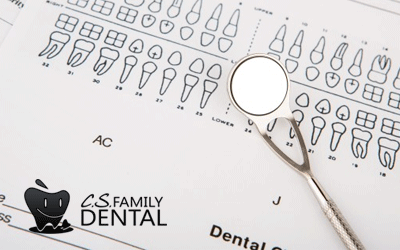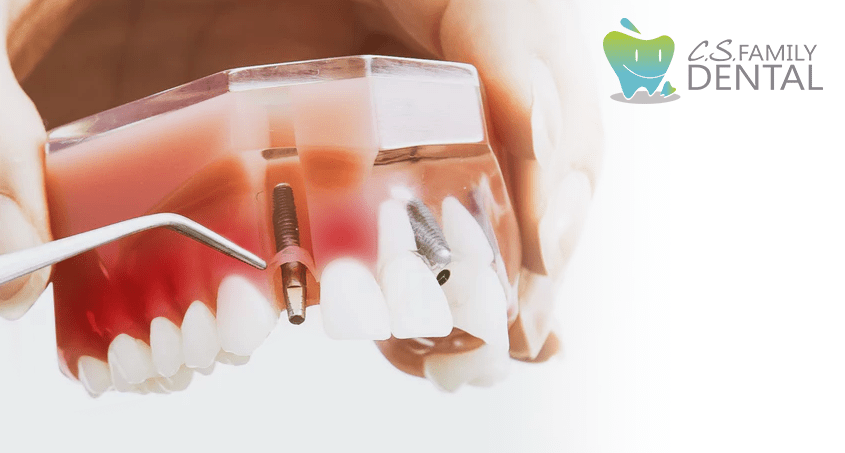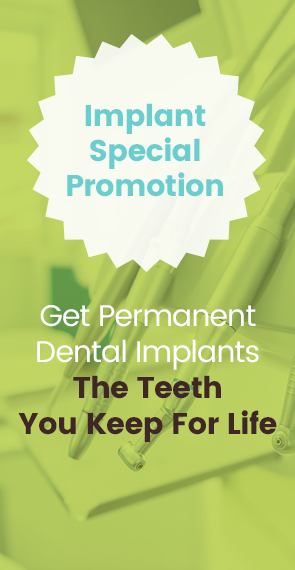Periodontal disease is one of the most popular types of dental diseases that we see here in our Denver, CO office. Unfortunately, many adults live with some type of gum disease and they do not even know it. The scarier part is that these adults who do live with it NEVER even know until their teeth are cleaned by a professional and many never even come in for regular teeth cleanings. Gum disease can be silent, and you may be symptom free for a long time. With that said, once you do start to experience symptoms of gum disease, the infection has been there for some time.
Patients who come into C. S. Family Dental and want to explore tooth replacement options will be presented with dental implants. Implants are a wonderful option for MOST patients, but they cannot be placed if the individual has periodontal disease.
Below, we will discuss the different types of gum disease and dental implants to help you better understand the two of them. If you are in need of a dental checkup or you would like to discuss dental implants with Dr. Sohn, now is the time to call our Denver office.
Types of Periodontal and Gum Disease

Picture: Freepik
Did you know that gum disease, left untreated, can lead to tooth loss and other serious health problems?
Below, Dr. Sohn will explore the different types of gum disease with you. If you have any questions, do not hesitate to contact our office.
Gingivitis
Gingivitis is the first stage of gum disease and ALWAYS occurs before periodontal disease. During this stage, you will find that your gums are typically swollen, red, and they bleed easily. In general, you will not experience discomfort during this stage.
This stage of gum disease occurs when patients do not properly brush or floss their teeth, or they have inadequate oral hygiene patterns. Dr. Sohn wants you to know that gingivitis CAN be reversed but early detection and treatment must be had.
There are several factors that make an individual more likely to develop gingivitis and those factors include:
- HIV infection
- Diabetes
- Aging
- Smoking
- Systematic disease and conditions
- Genetic predisposition
- Substance abuse
- Medications
- Pregnancy
- Hormone fluctuations
- Inadequate nutrition
- Puberty
- Stress
Periodontitis
When gingivitis is left untreated for long enough, it forms into periodontitis. This is when plaque and tartar form beneath the gum line and continue to grow and thrive there. There are toxins produced by this bacteria and they irritate the gums and thus lead to symptoms that are experienced by you, the patient.
The toxins in the plaque will trigger an inflammatory response within your body and this response is chronic and ongoing. This also means that the body works to fight those toxins, which leads to bone and tissue damage.
If you do have periodontitis, you will notice that the gums start to pull away from the teeth and this forms pockets that are infected over time. As the disease continues to progress, the pockets get deeper and more of your teeth, gum tissue, and bone are destroyed in the process.
When periodontitis first starts, you may notice little symptoms but as the disease continues, the symptoms will start to unfold.
There are several forms of periodontitis, which Dr. Sohn will cover below:
Chronic Periodontitis
This is a condition that results in inflammation of the tissues around the teeth and it leads to bone and tooth loss. This is the most common type of the disease and is often seen with gum recession.
Aggressive Periodontitis
This is a condition that occurs when the patient is otherwise considered healthy. Common symptoms of this type include rapid bone and tooth detachment.
Necrotizing Periodontitis
This is a condition where necrosis of the gum tissues is present, and it results in lesions in the mouth as well. Typically, this type of periodontal disease is only present in patients with immunosuppression, HIV, and malnutrition.
Periodontitis from Systematic Diseases
This condition occurs at a young age and is often the result of an underlying condition such as diabetes, heart disease, or respiratory disease.
Dental Implants: Important Information

Picture: Freepik
Many patients seek out dental implants due to missing teeth or because they want to improve the look of their smile. Dr. Sohn offers consultations for dental implants here in our Denver office and would love to speak with you about them.
Since dental implants are both popular and effective, they are heavily relied on to correct an individual’s smile or replace teeth that have been lost. The biggest issue with dental implants is that they cannot be placed in a patient’s mouth when periodontal disease is present. The reason behind this is because the bone in the jaw needs to be strong to hold and lock the implant in place. If the bone is not strong, the implant will fail.
Fortunately, if a patient suffers from gum disease or periodontitis, Dr. Sohn can correct and heal the infection and, if bone loss is present, utilize a grafting procedure to make it possible for the patient to receive dental implants.
Three Phases of Dental Implants
There are three phases to receive dental implants, and they are as follows:
Phase 1
Dr. Sohn will surgically place the dental implant into your jawbone. You will only be able to consume soft foods for a short time as the gums heal from the procedure.
Phase 2
This is the time when the jawbone and the dental implant fuse together to create a solid foundation. This process can take several months to complete.
Phase 3
During your final appointment, your implants will be fitted with artificial crowns or teeth. Once the crowns are in place, you will be able to smile, eat, and enjoy life as normal with a beautiful smile to sport.
Schedule a Consultation with Dr. Sohn Today
If you would like to discuss dental implants, it is imperative you schedule a consultation with Dr. Sohn to learn more and to ensure your mouth is healthy and can receive the implants. If you have periodontal disease, do not panic as there are options to heal it and correct any damage caused.
Contact C. S. Family Dental today to book your consultation in our Denver, CO office.


